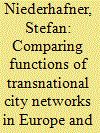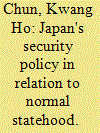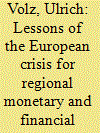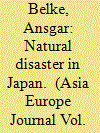|
|
|
Sort Order |
|
|
|
Items / Page
|
|
|
|
|
|
|
| Srl | Item |
| 1 |
ID:
124096


|
|
|
|
|
| Publication |
2013.
|
| Summary/Abstract |
Following the US "pivot" to Asia, the European Union (EU) announced its own pivot to Asia in 2012 with stepped-up engagement. A flurry of high-level visits to Asia, and in particular, Southeast Asia, by the High Representative of the Union for Foreign Affairs and Security Policy followed. The EU is looking for a much more comprehensive engagement of Asia, but at the same time, within Asia; there is always this nagging doubt as to whether the EU can be a serious security actor in Asia. This short brief surveys the constructive role that the EU can play in Asia and argues that the EU should stop fretting about whether it is seen as a serious security actor in Asia and instead focus on what it can do best and do its best in Asia.
|
|
|
|
|
|
|
|
|
|
|
|
|
|
|
|
| 2 |
ID:
124092


|
|
|
|
|
| Publication |
2013.
|
| Summary/Abstract |
In November 2010, the G20 Summit was held in Seoul. The G20 has increasingly replaced the G8 as being the premier forum for international economic cooperation, but in November 2010, it was the first time that a summit was held in country that was not a G8 member. It was by the Korean government seen as evidence of the country finally having achieved the goal of becoming an advanced nation playing, while still constrained by the division of the peninsula, a global role in line with its economic standing. The article argues that this has been a constant theme in Korea's foreign policy since it was originally formulated in 1994 as part of the country's globalization policy. This addition of an intentional dimension, to the objective capabilities created during the previous decades, has increasingly resulted in the type of behavior associated with middle power status.
|
|
|
|
|
|
|
|
|
|
|
|
|
|
|
|
| 3 |
ID:
124091


|
|
|
|
|
| Publication |
2013.
|
| Summary/Abstract |
Transnational city networks (TCNs) are organisations that facilitate information exchange, cooperation and lobbying activities of cities from different countries-independent of the national level. This paper compares the aims and goals of European and Asian city networks, asking if there are significant differences between the two regions or if certain global patterns of urban international relations can be identified. The analytical concept draws on the literature on European TCNs and identifies specific functions they provide to their membership. By way of a comparative analysis, this concept is extended to the Asian TCN cases. It is shown that in both regions, cities cooperate independently across national borders, circumventing the nation-state. Furthermore, sustainable development with a strong focus on environmental issues, and in particular climate change policy, is the most important policy goal in both Europe and Asia. The TCNs show major differences, however, in the areas of representation of and lobbying on behalf of their memberships. This leads to the conclusions that cities emancipate themselves from the higher tiers of government and that the Westphalian nation state loses coherence in both Europe and Asia, even though to specific degrees.
|
|
|
|
|
|
|
|
|
|
|
|
|
|
|
|
| 4 |
ID:
124095


|
|
|
|
|
| Publication |
2013.
|
| Summary/Abstract |
The paper reviews literature on perception within the international relations and the European Union (EU) studies in order to find out whether and how this concept can help us shed some light on the mutual relations between the EU member states. It examines the utilisation of perception as an analytical tool within the international relations where it was predominantly included into the foreign policy analysis approaches (image and role theory). Moreover, it was used for examining the views of the EU by other actors at not only bilateral but also multilateral level. Most studies analysed the perception of Asian countries, however, other areas, including Africa, were studied. Perception was utilised also at the EU level, when it was used for scrutinising different EU policies (foreign and security policies, enlargement), examining preference formation and influence of member states or investigating elite and public support for the European integration. The results show that perception is a valuable concept that can help us to analyse mutual relations between the EU member states in the enlarged and changed EU in several ways.
|
|
|
|
|
|
|
|
|
|
|
|
|
|
|
|
| 5 |
ID:
124093


|
|
|
|
|
| Publication |
2013.
|
| Summary/Abstract |
The paper begins by establishing the context in which Japan's normal statehood will be based. The paper shows how difficult it is for Japan to attain the status of a normal state based on the country's political forces and the rising powers in the Asian region. The paper looks at the relationships between Japan and other nations like China and South Korea, which should be considered by Japan in order to attain normal statehood. These are countries that initially were under the control of Japan, especially in business and even militarily, but today they are assuming their own position in the world; an aspect that is considered a threat to Japan's smooth return to normalcy. The paper takes into consideration the models that Japan can adopt or adapt to attain the status of a normal state. The three models discussed are those of Britain, Germany, and France. The main aspect discussed under these models is autonomy; this is based on the fact that Japan can only attain the status of a normal state if it becomes autonomous.
|
|
|
|
|
|
|
|
|
|
|
|
|
|
|
|
| 6 |
ID:
124090


|
|
|
|
|
| Publication |
2013.
|
| Summary/Abstract |
The debt crisis in several member states of the euro area has raised doubts on the viability of the European Economic and Monetary Union (EMU) and the future of the euro. While the launch of the euro in 1999 stirred a lot of interests in regional monetary integration and even monetary unification in various parts of the world, including East Asia, the current crisis has had the opposite effect, even raising expectations of a break-up of the euro area. Indeed, the crisis has highlighted the problems and tensions that will inevitably arise within a monetary union when imbalances build up and become unsustainable. This article discusses the causes of the current European crisis and the challenges that EMU countries face in solving it. Based on this analysis, it derives five lessons for regional financial and monetary cooperation and integration in East Asia.
|
|
|
|
|
|
|
|
|
|
|
|
|
|
|
|
| 7 |
ID:
124094


|
|
|
|
|
| Publication |
2013.
|
| Summary/Abstract |
This contribution focuses on the consequences of the natural disaster in Japan for the world financial markets as seen around half a year after the nuclear accident happened. It, thus, focuses on expectations about what would happen in macroeconomics terms later on. For this purpose, it examines how deep the slump in growth was, to what extent Japanese suppliers are integrated into international production chains, and how much the world economy would, thus, be affected. Moreover, it assesses what the economic implications of a forced withdrawal from nuclear energy as a reaction to the disaster would have been. Finally, it elaborates on the consequences of the natural disaster in Japan for the world financial markets and for the development of national debt.
|
|
|
|
|
|
|
|
|
|
|
|
|
|
|
|
|
|
|
|
|